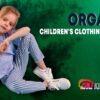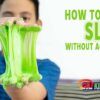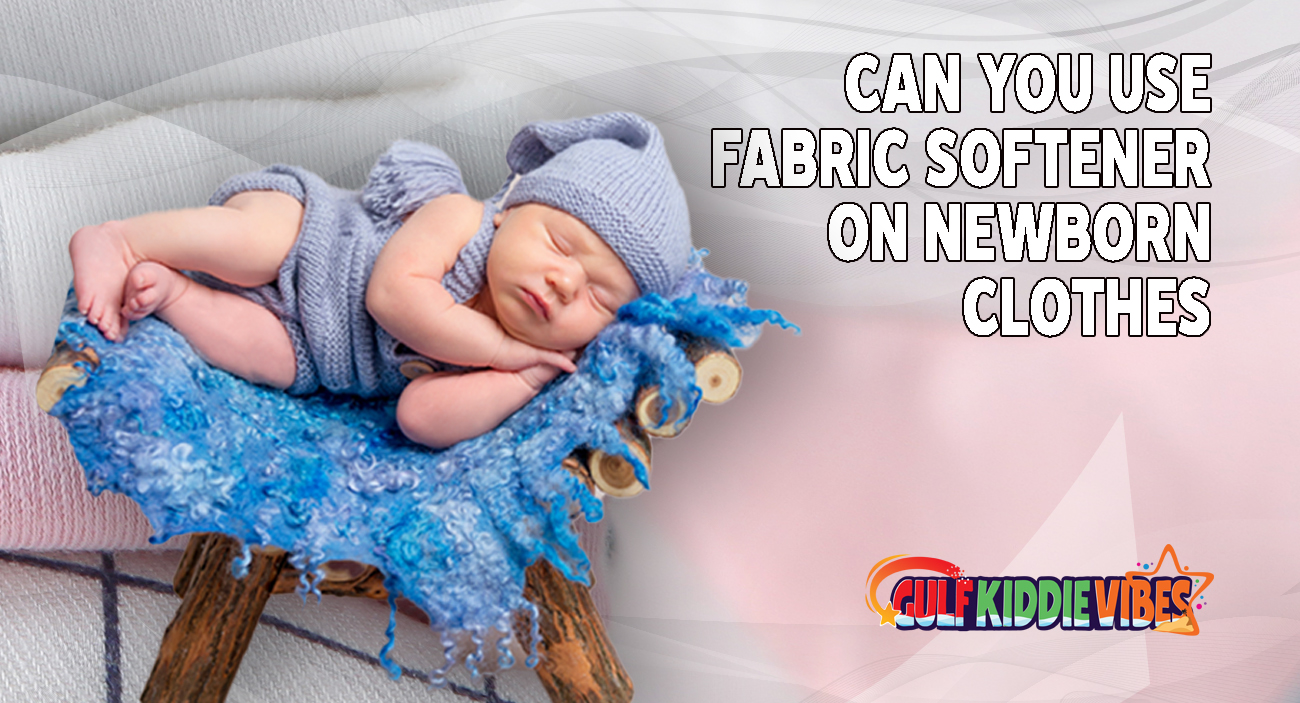
Can You Use Fabric Softener on Newborn Clothes? A Complete Guide for Parents
Can you use fabric softener on newborn clothes? Skip the fabric softener—it’s not worth the risk! Harsh chemicals and residues can harm your baby’s sensitive skin, leading to irritation or allergies. Swap it out for gentle, natural solutions like baking soda or wool dryer balls to soften clothes without the worry. Pair these with hypoallergenic detergents and proper washing habits, and you’ll have the softest, safest clothes for your newborn!
Table of Contents
Parents should know that their newborn has extremely sensitive skin; therefore, they must take extra care with their clothing. From pre-washing to only air-drying them, these steps or precautions are all necessary to ensure your baby can easily wear their clothes and be comfortable.
One question related to newborn clothes care is whether you can use fabric softeners on newborn clothes. The answer is no because these softeners are made with chemicals that can cause skin irritation and other health issues for the newborn. The better choice would be to use something like white vinegar, baking soda, or wool dryer balls to soften clothes safely.
We will also discuss alternative choices for new parents, how to wash newborn clothes, and what mistakes to avoid when washing newborn clothes.
Why Newborn Clothes Require Special Care
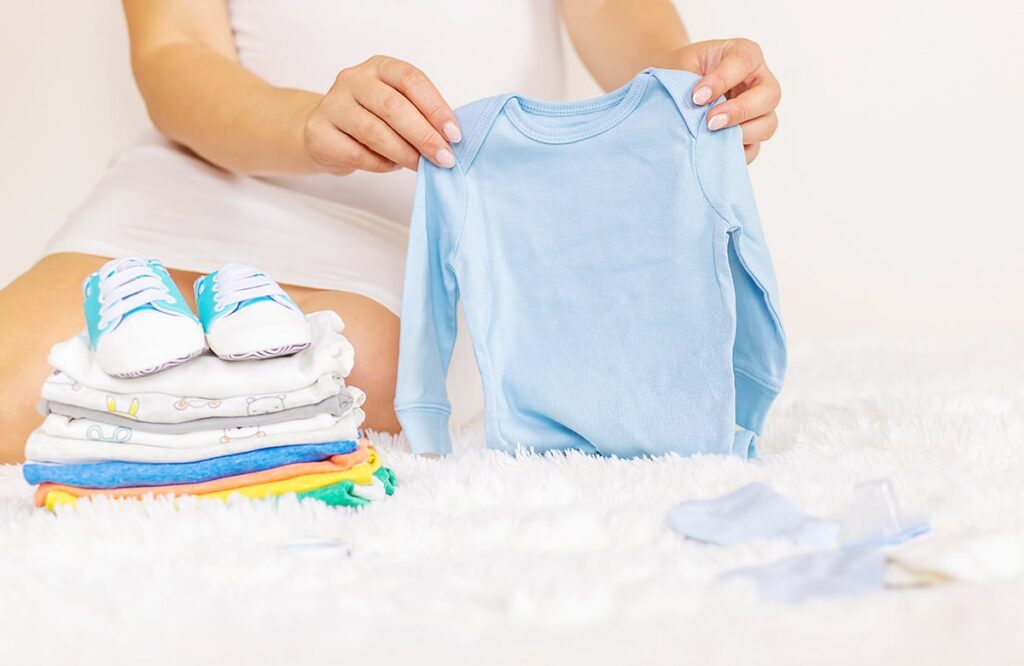
Before discussing whether you can use fabric softener on newborn clothes, we must explain why they require special care.
The Delicate Nature of Newborn Skin
Newborn clothes need special care when cleaning because of their sensitive skin. Because newborns are brand new, their skins can’t handle the external environmental factors adults or grown kids can. As such, they require external protection from their clothes. Also, babies have a higher surface area to body weight ratio, meaning they absorb substances more easily than adults.
However, new clothes are often treated with chemicals and contain residues from manufacturers’ machine cleaning. These chemicals and residues, in turn, are also factors newborns have no protection against. This is why newborn clothes need special pre-washing that removes all chemicals or residues. Our website has even more information about the need for pre-washing newborn clothes and how you can do it.
The Role of Fabric in Baby Comfort
The fabric type you choose can greatly affect how comfortable your newborn is. Different fabrics have different properties that help ensure your baby is safe and cozy while wearing them. For example, 100% cotton clothing is breathable, hypoallergenic, and free from harmful pesticides. Babies wearing it feel extremely comfortable, and their delicate skin is safe from toxic products.
Parents can choose other such natural fabrics that ensure similar benefits and protections. Fabrics such as bamboo and organic fabrics are some of our top recommendations. On the other hand, clothes made from synthetic materials such as polyester should be avoided. These materials trap heat and moisture and cause rashes, skin lesions, and more. All these are bad for grown kids and adults, so imagine how bad they are for newborns. Hint hint; it’s terrible.
What Is Fabric Softener and How Does It Work?

Fabric softeners help to soften fabrics, don’t they? Yes, they do. So they should help wash newborn clothes, right? No, they aren’t. Why? This is because they have chemicals that aren’t suitable for babies. It’s time you learned what fabric softener is and its pros and cons for washing clothes.
The Science Behind Fabric Softeners
When you know what fabric softener is and what it is made from, you will know why you cannot use it on newborn clothes. It’s basically a laundry product that helps to improve the feel and quality of clothes by “softening” them. It also makes clothes static-cling-free while giving them a pleasant smell.
The science behind how they do all of this is related to the chemicals that make up fabric softeners. The primary chemical is cationic surfactants, and it has a positive electrical charge. This positive charge clings to the negative charge in clothes, creating an attraction. The attraction is what gives the clothes cleaned with softener a smooth feeling.
Aside from the cationic surfactants, other common chemicals in the product have different properties. Here are some of those chemicals:
- Emulsifiers: Aids in distributing other chemicals more evenly.
- Fragrances: Gives the clothes a more pleasant aroma.
- Preservatives: Improves clothes’ lifespan.
Pros and Cons of Using Fabric Softeners
While there are pros to using softeners while cleaning clothes, these chemicals also have cons. One of these cons is that you can’t use fabric softener on newborn clothes. But before we get into the negatives, let’s at least go over some of the positives first.
Pros of fabric softener:
Softer clothes:
- The main reason for using softener is that it softens clothes (in the name).
- By softening, the clothes also become more comfortable to wear.
Reduces static:
- Certain fabrics, such as cotton, are known to produce static, but softeners can prevent it.
- Static builds up during the dry or chilly months, too, and a softener is recommended at those times as well.
Pleasant smell:
- Thanks to the chemicals in the softener, clothes tend to smell quite pleasant.
- Children’s clothes can smell bad, so parents might like to use them for a better smell.
Easier to iron:
- Soft fabrics are easier to iron since they are less wrinkled.
Cons of fabric softener:
Chemical residue:
- The main con of fabric softeners is that they have chemicals that harm newborns.
- Some of the chemicals are known to cause severe health issues for babies.
Allergic reactions:
- Many young and old people have been found to be allergic to softeners.
- The allergy may be due to the synthetic fragrances and dyes.
Skin irritation:
- Due to allergic or chemical reactions from the softener, babies may experience rashes and other skin irritations.
Environmental impact:
- Fabric softeners aren’t made with bio-degradable materials. As such, they are not environmentally friendly.
- As such, they hurt the planet.
Can You Use Fabric Softener on Newborn Clothes?
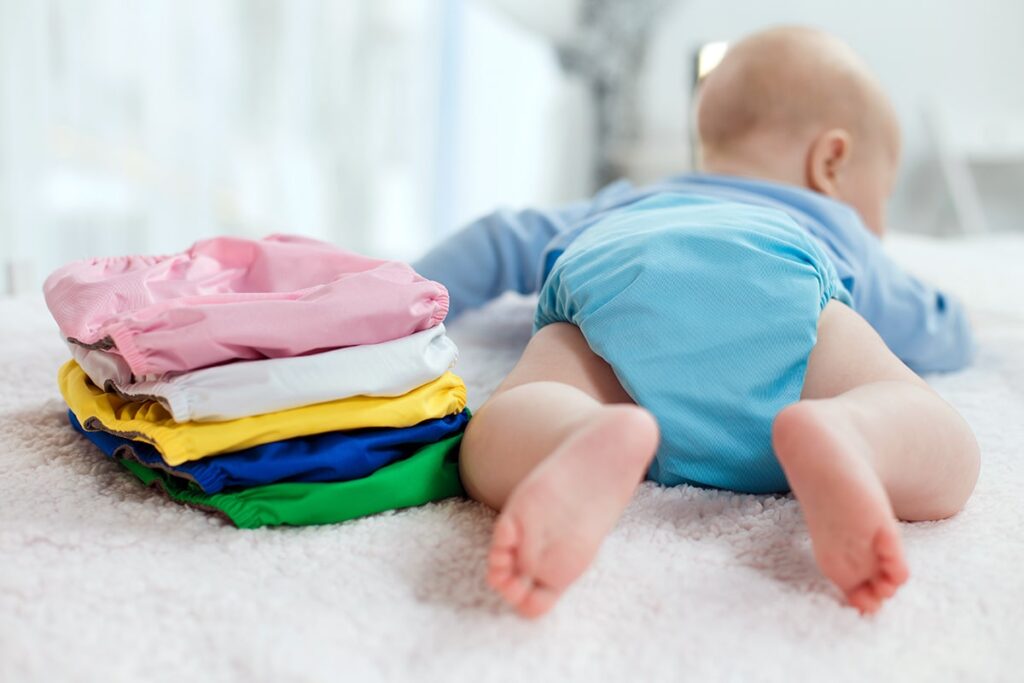
As you know, the answer to the question of whether you can use fabric softener on newborn clothes is a big no. But why is what we will be discussing now. Afterward, we will look at the expert recommendation on what you may use to pre-wash newborn clothes.
Potential Risks of Fabric Softeners for Newborns
Due to chemicals such as quaternary ammonium compounds (quats) and cationic surfactants, softeners are not advisable when washing newborn clothes. These commercial chemicals are known to cause numerous health issues for newborns, some of which we will be going over now. The potential problems are:
Skin irritation or rashes:
- One of the major issues caused by fabric softener on newborn clothes is that it causes rashes and skin irritation for babies.
- Newborns’ skin is super delicate, and as such, it can’t handle the chemicals in the softener, which is what causes the irritation.
Allergic reactions:
- Many people, including newborns, have been found to be allergic to general or specific brands of fabric softeners.
- The allergy is typically due to the fragrances or dyes found in the fabric solution.
- The allergy, in newborns, causes redness, itching, or general discomfort in the affected person.
Respiratory issues:
- Related to the above issues, the strong fragrance of softener causes respiratory issues in newborns and adults.
- The chances of these are much greater in the cases of newborns born with asthma or sensitivities.
Aside from these direct risks of fabric softeners, parents also need to consider indirect risks. Indirect risks such as:
Reduced breathability:
- Due to the residue softener leaves on clothes, it can reduce their breathability.
- The residue can also cause the clothes to trap bacteria, causing the clothes to be less hygienic even after washing.
- This cannot be good for swaddle blankets, sleepwear, and onesies.
Reduces absorbency:
- The chemicals in the softener can also reduce the absorbency rate of newborn clothes.
- Items such as burp cloths, bibs, and cloth diapers must be highly absorbent, but softeners can compromise them.
- This can cause leaks or great discomfort for your baby.
Expert Recommendations
Most experts recommend against using fabric softeners on newborn clothes. Instead, they recommend using more natural solutions, which we will cover next. Dr. Emily Carter, a pediatric dermatologist, says, “Newborns have extremly sensitive skin that can react to even the mildest chemicals. Fabric softeners contain ingredients that can cause irritation, rashes, or allergic reactions. It’s best to avoid them altogether and opt for gentler, baby-safe alternatives.”
According to experts such as her, the better practices would be:
- Baby-safe detergent:
- Experts say using hypoallergenic, fragrance-free detergents on newborns is much safer than fabric softeners.
- Experts recommend ones that are labeled “pediatrician-recommended” or “dermatologist-tested.”
- Skip fabric softeners:
- You don’t need to use fabric softeners on newborn clothes because there aren’t any benefits.
- If you need to soften baby clothes, use the natural remedies we will mention later.
- Pre-wash baby clothes:
- Simply pre-washing newborn clothes will be enough to remove chemicals, dyes, or residues.
- It will also soften up the clothes slightly as well.
- Rinse washed clothes:
- To ensure no residues clinging to your newborn clothes after washing, rinse them thoroughly.
- Go for one or more rinse cycles to be on the safe side.
- Air-dry only:
- Experts all say never to machine dry newborn clothes as that damages the clothes.
- Instead, the safer but slower method would be to air dry all the clothes.
These expert recommendations will ensure your newborn clothes are softer, cleaner, and free of damaging chemicals.
Related: How to Organize a Newborn Dresser: An Expert’s Guide
Safe Alternatives to Fabric Softeners for Newborn Clothes
Parents want to use it even though you don’t necessarily need fabric softener on newborn clothes. This is because they want to ensure the clothes feel softer and more comfortable for their newborns. However, the softener is dangerous to newborns, so what can you do? Go with these natural alternatives, of course!
Natural Ways to Soften Baby Clothes
Many options are available for those looking to wash their newborn’s clothes and give them a more comfortable feel. Some of these methods are also quite eco-friendly and economical. Here are our top natural alternatives to using fabric softener on newborn clothes:
White vinegar:
- No other kitchen item is as versatile as white vinegar. In addition to cooking and pickling, it can also be used to clean clothes.
- Put ½ cup of white vinegar into the washing machine’s rinsing cycle, along with your newborn clothes, and watch how it leaves them soft and clean.
Baking soda:
- Baking soda is another cooking item that greatly helps out during cleaning tasks.
- Like white vinegar, add ½ cup of baking soda to your baby’s clothes during the washing cycle.
- The soda will disappear while leaving the clothes super soft and odor-free.
Wool dryer balls:
- These dryer balls are a reusable, chemical-free alternative to fabric softener.
- You put them in the dryer, duh, and they separate the baby clothes and allow for more airflow.
- This dramatically reduces drying time, prevents static cling, and softens clothes without chemical aid.
- Put a few drops of baby-safe essential oils to the dryer balls for a fragrance kick.
DIY fabric softener:
- For a quick, easy, and natural method of softening baby clothes, you can use a DIY fabric softener.
- Mix one cup of water, one small spoon of baking soda, and 5-10 drops of baby-safe essential oil in a spray bottle.
- Add a few spritzes to baby clothes while ironing and folding them to get all the benefits of the softener without any harmful chemicals.
Choosing Baby-Safe Laundry Products
So, you don’t use fabric softeners while cleaning your newborn clothes, but you will need some cleaning solutions. So, how do you pick ones that are safe for your newborn? Here is how:
- Look for hypoallergenic formula: Pick out washing solutions with hypoallergenic marks. These will ensure that your newborn is at minimal risk of allergic reactions.
- Look for fragrance-free or natural scents: Choose options without synthetic fragrances to ensure your newborn’s skin is not irritated.
- Look for eco-friendly marks. These marks ensure that your washed newborn clothes are gentle on your newborn’s skin.
We recommend brands such as Dreft, Babyganics, and Seventh Generation, as they are made with ingredients that are safe for babies of all ages and genders. You should also follow the instructions on the back of these products to ensure that no residue is left on the clothes.
Wash baby clothes separately from your clothes to avoid cross-contamination. Finally, use extra rinse cycles to ensure that no chemicals or residues remain on baby clothes that might irritate their skin.
Common Mistakes to Avoid When Washing Newborn Clothes
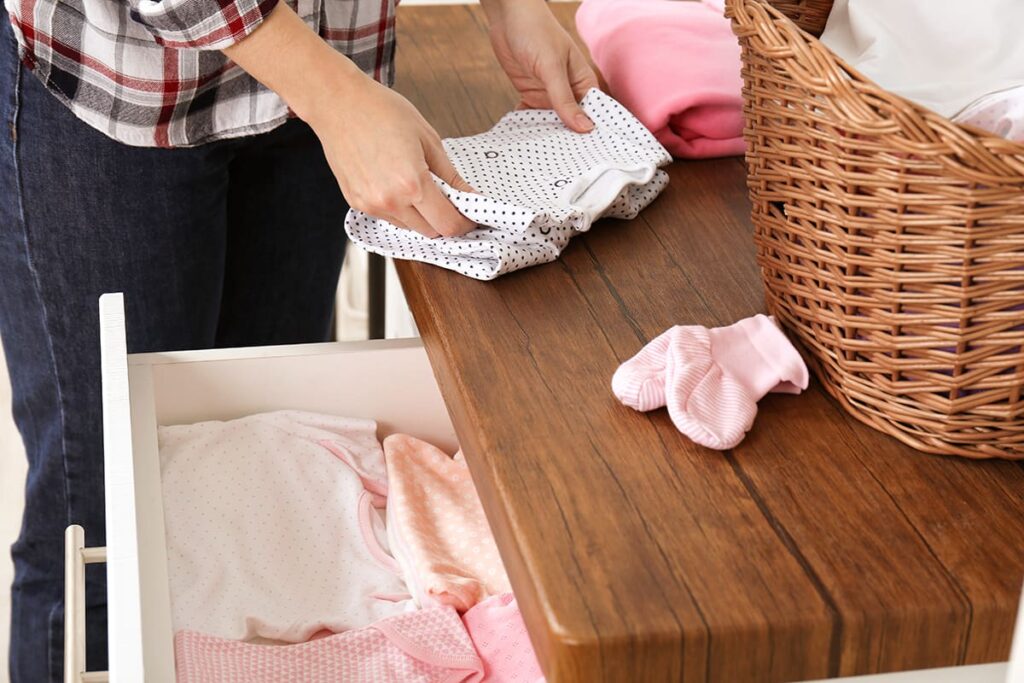
While we hope you don’t use fabric softener on newborn clothes anymore, thanks to our explanation, we know you will make other mistakes while washing them. To ensure you avoid making mistakes while washing newborn clothes, we have listed some of the common ones. Here they are:
Using too much detergent:
- Too much of anything is bad, which also holds true for detergents.
- Even if you use baby-safe ones, too much will cause residues to remain.
- This can cause rashes or skin irritations for your newborn when they wear them.
Ignoring care labels:
- The care labels ensure parents know how to properly wash the newborn clothes.
- Ignoring them will only result in damaging the clothes or destroying them outright.
Skipping pre-washing:
- Not washing pre-washing newborn clothes will result in the chemicals used by manufacturers remaining.
- These harmful chemicals shouldn’t be touching your newborns’ delicate skin.
Mixing up adult and baby clothes:
- Newborn clothes are generally quite delicate, so they should be washed separately from the adult clothing.
- Separate washing will also ensure that no cross-contamination happens.
Frequently Asked Questions
1. Is fabric softener safe for newborn clothes?
Fabric softeners are not safe for newborn clothes due to harsh chemicals like quats and synthetic fragrances that can irritate sensitive skin. These residues may cause rashes or allergies. Opt for baby-safe laundry products or natural alternatives like white vinegar and baking soda to keep clothes soft and safe.
2. What can I use instead of fabric softener on newborn clothes?
Instead of fabric softener, use natural alternatives like white vinegar, baking soda, or wool dryer balls. These options soften clothes without harmful chemicals. Choose hypoallergenic, fragrance-free detergents and baby-safe laundry products to ensure your newborn’s clothes remain gentle on their delicate skin.
3. Can fabric softener cause rashes on a newborn’s skin?
Yes, fabric softeners can cause rashes on a newborn’s skin. The chemicals and residues left on clothes can irritate sensitive skin, leading to redness, dryness, or allergic reactions. To prevent skin irritation, avoid fabric softeners and use baby-safe laundry products.
4. How often should I wash newborn clothes?
Newborn clothes, especially onesies, bibs, and burp cloths, should be washed after every use to maintain hygiene. Pre-wash new clothes to remove manufacturing residues. Use baby-safe detergent and warm water to ensure cleanliness and protect your baby’s delicate skin.
Conclusion
You should not use fabric softener on newborn clothes because the chemicals in the cleaning solution are harmful to newborns. Newborns have delicate skin, so they require more care when washing their clothes. Health issues like skin irritation, allergies, and respiratory concerns are possible if newborns wear clothes washed with fabric softener and non-baby-safe detergents.
Experts recommend using more natural alternatives to fabric softener on baby clothes. Solutions like white vinegar, baking soda, or DIY fabric softener are much preferred, and they work even better than commercial softener in some cases.
Follow our expert suggestions and avoid common mistakes others make to ensure you wash your newborn clothes with care. Ensure your babies wear only the softest and safest clothes from now on with our help.


